Ifi Neo iDSD2 – DAC
$1799
done In Stock At Distribution Centre
close Click & Collect - Ready In 3-5 Days
Ifi Neo iDSD2 – DAC
$1799
done In Stock At Distribution Centre
close Click & Collect - Ready In 3-5 Days
Ifi Neo iDSD2 – DAC
iFi NEO iDSD2 DAC Headphone Amplifier with High Resolution Bluetooth
The world’s first lossless Bluetooth DAC/Amp
Supports new aptX Lossless – the only Bluetooth codec capable of streaming lossless CD-quality audio, AND boasts a powerful maximum 5551mW output that outshines many headphone amps.
It’s head-fi. It’s desk-fi. And it’s hi-fi.
The NEO iDSD 2 is our versatile new 3-in-1 DAC/Amp, designed specifically for CAS audiophiles. It pairs effortlessly with your headphones as a Head-Fi DAC/Amp, can be used as a pure DAC with your integrated amplifier, or serve as a DAC/Preamp for your active speakers and power amplifier.
It features the latest Bluetooth 5.4, supporting the new aptX Lossless, the only Bluetooth codec capable of streaming lossless CD-quality audio without sacrificing audio quality.
The NEO iDSD 2 has improved headphone and line outputs, providing ample power for your high-demanding headphones, as well as power amplifiers.
My Blue isn’t your blue. It’s new and Lossless.
The NEO iDSD 2 features the latest Bluetooth 5.4 technology, supporting the new aptX Lossless codec, which provides a maximum bitrate of 1,200kbps. In comparison, aptX Adaptive has a maximum bitrate of 420kbps, while LDACTM offers a higher bitrate of 990kbps.
However, aptX Lossless is the first and only Bluetooth codec capable of streaming CD-quality audio without using a compression method that degrades sound quality. While other Bluetooth codecs claim to support CD-quality and even hi-res audio, they employ lossy compression during transmission, which negatively affects sound quality.
The NEO iDSD 2 used Qualcomm’s new QCC518x Bluetooth audio chip, is qualified to Bluetooth 5.4, supported all* Bluetooth formats including: aptX Lossless, aptX Adaptive, aptX, LDACTM, LHDC/HWA, AAC and SBC.
5x more headphone output power than its predecessor.
You heard me correctly – the headphone output power of the NEO iDSD 2 is a whopping 5 times more powerful than that of the 1st-gen NEO iDSD. With a maximum headphone output power of 5,551 mW (@ 32Ω), it outperforms even some dedicated headphone amplifiers, making them sweat. The headphone section has seen significant improvement, as we’ve essentially integrated a Diablo headphone circuit into it.
It features Auto iEMatch to reduce annoying hiss from high-sensitivity headphones without losing any dynamic range and four gain settings ranging from -12dB to +16dB, making it suitable for all your IEMs and headphone types, from super-sensitive to power-hungry.
The NEO iDSD 2 is not only a powerhouse, but it’s also tailored for your ears. The newly added analogue processing modes, XSpace and XBass II, along with the four digital filters, allow you to finetune the sound. Both XSpace and XBass II are pure analogue signal processing modes designed to adjust the soundstage and low-frequency response to match your headphones.
Stand by you. No matter up or down.
Whether you’re using the NEO iDSD 2 as a Desk-Fi or Hi-Fi, you can position it horizontally or vertically. The new 2-inch colour display automatically rotates to suit the orientation.
When using it as a Desk-Fi, you can position it vertically on your desk to save space. Set it to variable output, and with its powerful 19.5V maximum balanced output, it works well with your active speakers with volume control. The volume control is analogue, which is superior to any digital volume control.
When using the NEO iDSD 2 as a Hi-Fi, you can place it horizontally. It can serve as a pure DAC, playing all Hi-Res music files from PCM 32-bit/768kHz to DSD512 and full MQA decoding. You can also connect it directly to your power amplifier as a preamplifier, utilising its analogue volume control.
GMT Femto-Precision Clock. Upgradable.
The internal GMT femto-precision clock, combined with a smart storage cache, forms an advanced jitter reduction system. It effectively reduces jitter in the digital signal, producing cleaner and more accurate sound.
If you possess a more accurate external clock, or if you wish to synchronize with other devices such as CD players or network streamers that have an external clock input, you can connect both the NEO iDSD 2 and the other devices to the external clock via the 10MHz External Sync Clock input for even greater clock signal accuracy.
It’s rare to find an External Sync Clock input in this price range. Even if you don’t have an external clock, the internal GMT femto-precision clock still offers excellent performance in its class.
More than new features. Enhanced circuitry.
The NEO iDSD 2’s enhanced PureWave circuit design, with its balanced dual-mono topology and short signal paths, is known for outstanding linearity and minimal noise and distortion, offering you exceptional sonic purity.
The results are an improved Signal-to-Noise Ratio (SNR) of >120dB(A), Dynamic Range (DNR) of -120dB(A), and Total Harmonic Distortion plus Noise (THD+N) of <0.0015%, bringing the NEO iDSD 2’s performance on par with DACs at a higher price point.
Introducing the new iFi Nexis App
Introducing the iFi Nexis App for your NEO iDSD 2. Simply search for “NEO iDSD 2” in the app to access a suite of features and settings. Easily perform OTA upgrades, which automatically update your device over the network.
The app offers a convenient way to control your NEO iDSD 2, allowing you to adjust functions and settings with ease. Download the iFi Nexis App now and experience the full potential of your NEO iDSD 2.
- Hi-res audio support is state-of-the-art with True Native® playback. It handles PCM data to 32-bit/768kHz, DSD up to DSD512 and single and double speed DXD.
Thanks to the Burr-Brown DAC chip’s four-channel True Native design, PCM and DSD take separate pathways – this enables DSD, as well as PCM, to remain ‘bit-perfect’ in its native form right through to analogue conversion. This is not the case with all DAC devices from other brands – even if DSD compatibility is stated, many such DACs convert DSD signals to PCM.
- The XMOS 16-Core chip processes the audio data received via the USB* digital input.
This new low-latency XMOS microcontroller has greatly enhanced processing power. Compared to the current generation of eight-core chips, this new 16-core IC delivers double the clock speed (2000MIPS) and four times the memory (512KB), as well as the latest SuperSpeed USB standard.
iFi’s in-house digital development team has programmed the XMOS firmware to optimise sound quality and ensure a perfect partnership with the Burr-Brown DAC.
- Extensive jitter-eradication technologies are applied to the digital stage, including our GMT (Global Master Timing) femto-precision clock and intelligent memory buffer. This represents a total ‘out-of-the-box’ systematic digital solution that solves jitter once and for all.
- The Burr-Brown True Native® chipset means file formats remain unchanged or ‘bit-perfect’. This means you are listening to music as the artist intended in the format in which it was recorded.
At iFi we use Burr Brown extensively in our products having selected it for its natural-sounding ‘musicality’ and True Native architecture. Our experience with this IC means we know how to make the most of it.
- MQA (Master Quality Authenticated) is supported through the USB with full decoding of MQA files up to 384kHz thanks to the processing power of the new 16-core XMOS chip.
This means that the full ‘three unfold’ decoding process is performed internally, as opposed to only the final unfold in the manner of an MQA ‘renderer’.
Globally, MQA has become an important consideration for any comprehensively equipped DAC. It is available through for Tidal Masters, Audirvana and Roon.
- We use Qualcomm’s new QCC518x Bluetooth processing IC in combination with proprietary circuits to create an audibly superior ‘Bluetooth engine’.
All the current high-definition Bluetooth audio formats are supported – Qualcomm’s aptX Lossless and aptX Adaptive, Sony’s LDACTM and HWA’s LHDC, regular aptX, AAC (Apple iOS devices) and SBC (the ‘plain vanilla’ Bluetooth codec).
All of the 24-bit-capable codecs, including aptX Lossless, aptX Adaptive, LDACTM, and LHDC, support up to 96kHz.
iFi’s ‘Bluetooth engine’ can also be updated over-the-air, so future codecs may be added.
- As with many other iFi audio products, we’ve incorporated a custom OV Series operational-amplifier. This top-notch component contributes to the extremely low noise, low distortion (0.0001%) and wide bandwidth.
- Balanced, differential analogue circuit design has long been championed for its ability to reduce noise and cross-talk within the signal path by fully separating the left and right channels.
PureWave is a new, balanced, symmetrical dual-mono topology with short, direct signal paths. The name refers to the sonic purity it achieves thanks to exceptional linearity and infinitesimally low levels of noise and distortion.
- Switching between settings has been engineered to ensure sonic transparency with advanced trench technology MOSFET is used as a muting switch.
This FET-based switching is handled by a micro-controller, which only ‘wakes up’ when the user changes a setting, thus eradicating any sonically deleterious interference.
- TDK C0G (Class 1 ceramic) capacitors offer high stability and low losses for resonant circuit applications.
Getting ever closer to the theoretical ideal of pure, frequency-constant capacitance, these capacitors reduce capacitor-induced distortion to vanishingly low levels.
- Texas Instruments low-noise ICs offer great unity-gain bandwidth, very low noise and distortion, high output drive capability, Common-mode and Power Supply Rejection Ratios of over 100 dB, wide maximum-output-swing bandwidths and high slew rates.
- muRata control-type, low-ESR high-Q multi-layer capacitors. The ‘ESR control’ aspect of the Murata is something special. Their noise suppression abilities are impressive.
- Extensive jitter-eradication technologies are applied to the digital stage, including our GMT (Global Master Timing) femto-precision clock and the intelligent memory buffer.
The low-jitter crystal clock has been updated to provide >20dB better performance
Technical Specifications: Inputs: Digital USB3.0 B (USB2.0 compatible); S/PDIF (coaxial up to 192kHz, optical up to 96kHz) Bluetooth 5.4 (aptX Lossless, aptX Adaptive, aptx, LDAC, HWA/LHDC, AAC and SBC) Analogue UnBAL 3.5mm Clock: External Sync Clock 10MHz, 1Vpp nominal, 75Ω. Sinewave or Squarewave Format: PCM 768kHz; DSD 512 (22.6MHz); MQA Full Decoder Line Section Outputs: Balanced XLR 19.5V max. (variable) 4.4V fixed UnBAL RCA 10.5V max. (variable) 2.2V fixed Output Impedance: XLR ≤100Ω; RCA ≤50Ω SNR: <-120dB(A) @ 0dBFS DNR: >120dB(A) @ -60dBFS THD+N: <0.0015% @ 0dBFS Headphone Section Output: Balanced 4.4mm 3.5V / 19.5V max. (12Ω – 600Ω Headphone) UnBAL 6.3mm 4.5V / 9.50V max. (12Ω – 300Ω Headphone) Maximum^ Output Power: Balanced >19.5V/650 mW (@ 600Ω); >13.3V/5,551 mW (@ 32Ω) UnBAL >10.5V/184 mW (@ 600Ω); >9.5V/2,832 mW (@ 32Ω) RMS Output Power: Balanced >19.3V/620 mW (@ 600Ω); >12.7V/2530 mW (@ 64Ω) UnBAL >9.7V/157 mW (@ 600Ω); >9.4V/1390 mW (@ 64Ω) Output Impedance: <1Ω SNR: >120dB(A) (3.3V 6.3mm/6.2V 4.4mm) DNR: -120dB(A) THD + N: <0.0015% (125mW @ 32Ω) Power supply requirement: DC 9V/1.5A – 15V/0.9A (centre +ve)* Power consumption: No Signal ~5W; Max Signal ~13.5W Dimensions: 214 x 158 x 41 mm (8.4″ x 6.2″ x 1.6″) Net weight: 916g (2.0 Ibs)
Related products
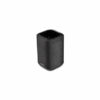 Black
Black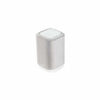 White
White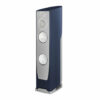 Aria Metallic Blue
Aria Metallic Blue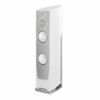 Harmony Gloss White
Harmony Gloss White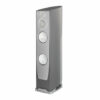 Sonic Metallic Silver
Sonic Metallic Silver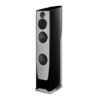 Vanta High Gloss Black
Vanta High Gloss Black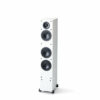 Gloss White
Gloss White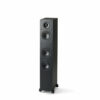 Satin Black
Satin Black






















